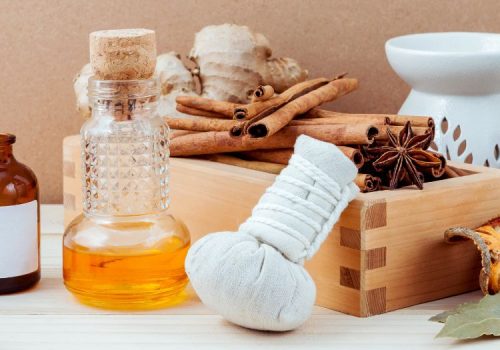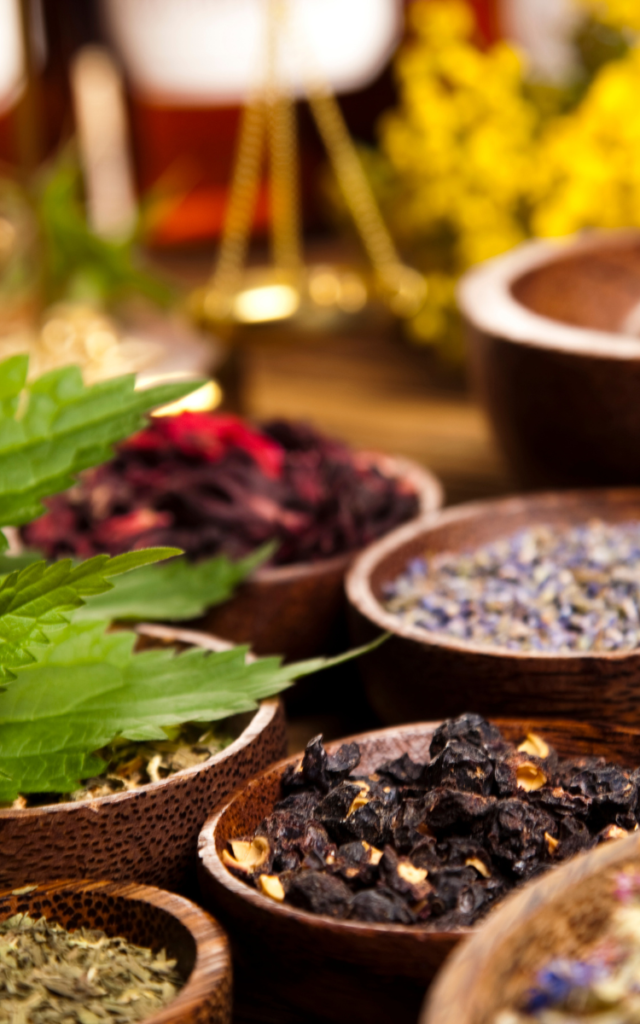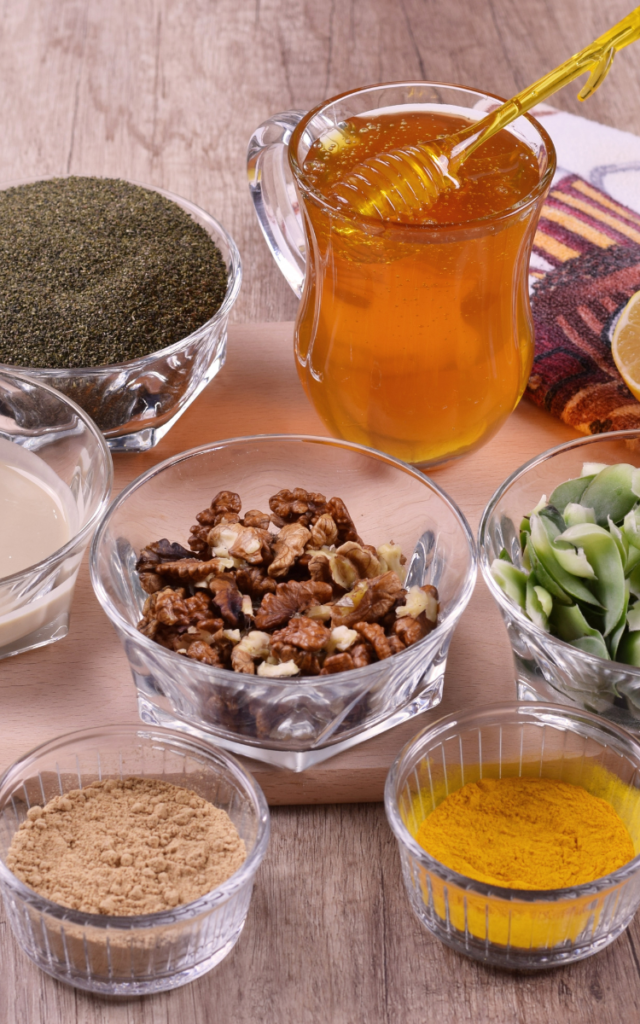Ayurvedic & Medicinal Plants
Ayurvedic & Medicinal Plants
The true essence lies within
Due to the rapid pace of modern life, many of us find ourselves increasingly detached from nature. Our bustling lifestyles can have detrimental effects on our well-being. However, it’s crucial to recognize that incorporating small changes into our daily routines can significantly contribute to our health and vitality. Thus, the relevance of Ayurveda remains profound in contemporary society, as it advocates reconnecting with nature and harnessing its innate healing powers, free from adverse side effects.
Ayurvedic treatments and products have gained prominence for their use of natural ingredients and medicinal herbs, offering a sense of security compared to synthetic drugs, which are often viewed as unsafe and detrimental to overall health.
A fundamental aspect of understanding Ayurveda involves immersing oneself in nature and observing the properties of various plants and herbs. Each botanical species possesses unique qualities that can address a multitude of ailments and illnesses. Common medicinal plants such as aloe, turmeric, tulsi, pepper, cardamom, and ginger are frequently utilized in Ayurvedic home remedies, particularly for treating throat and skin conditions. Renowned for their rich nutrient content, antibacterial properties, and antioxidants, Ayurvedic herbs offer non-toxic alternatives, making products and remedies derived from them highly sought after for their therapeutic benefits.
The efficacy of herbal medicinal treatments stems from their safety profile and absence of adverse effects. Aligned with the natural order, these plants offer distinct advantages over chemically processed products and synthetic medications. Unlike conventional drugs, Ayurvedic herbs target the root cause of ailments, promoting long-term health and fitness.


Medicinal Plants & Their Uses
Besides their medicinal applications, Ayurvedic herbs find utility in areas such as pest management, natural dye production, and the formulation of food items, teas, and perfumes, among other uses. Recent global research indicates a notable increase in the number of individuals resorting to natural herbs for both treatment and daily usage. This trend reflects a return to fundamental practices, as people recognize the potential dangers posed by chemically treated products and opt for healthier alternatives, embracing Ayurveda and its principles as integral components of their lifestyles.
Medicinal Plants & Their Uses
| Hindi Name | English Name | Botanical Name | Uses |
|---|---|---|---|
| Adusa/Vasaka | Malabar Nut | Adhatoda vasica Nees | Cough, Asthma, Bronchitis |
| Ananas | Pineapple | Ananas comosus | Sore Throat, Diabetes, Heart Disease, Obesity |
| Babool | Indian Gum | Acacia arabica Willd | Oral Care, Bleeding Gums, Wounds |
| Brahmi | Thyme leafed gratiola | Bacopa monniera Pennel | Enhances Memory, Anxiety |
| Dhaniya | Coriander | Coriandrum sativum Linn | Useful in Indigestion, Flatulence, Controls Spasmodic Pain |
| Kalmegh | Kalmegh | Andrographis paniculata | Indigestion, Acne, Diarrhea |
| Lashun | Garlic | Allium sativum | Ringworm, Dysentery, Wounds |
| Nagarmotha | Nut Grass | Cyperus rotundus Linn | Fever, Diabetes, Solar Dermatitis |
| Punarnava | Spreading Hogweed | Boerhaavia diffusa Linn | Anemia, Liver Diseases, Wounds, Kidney health |
| Shalparni | Shal Leafed Bush | Desmodium gangetium DC | Analgesic, Anti-Inflammatory |
| Tulsi | Holy Basil | Ocimum sactum Linn | Indigestion, Heart health, Respiratory Diseases |
| Vridhadaru | Elephant Creeper | Argyreia speciosa Sweet | Diabetes, Skin Diseases, Wounds |
| Agarkasth | Eagle Wood | Aquilaria agallocha Roxb | Bed-Wetting, Incontinence of Urinary Bladder |
| Ankol | Sage leaf alangium | Alangium salvifolium | Traditionally used in Snakebite, Scorpion Bite, Dog Bite |
| Badi Elaichi | Greater Cardamom | Amomum subulatum Pennel | Bronchitis, Asthma, Appetizer, Digestant |
| Chirchita | Prickly chaff flower | Achyranthes aspera | Indigestion, Cough, Asthma, Liver health |
| Elaichi | Lesser Cardamom | Elettaria cardamomum Maton | Nausea, Vomiting, Dry Cough |
| Kanghi | Country Mallow | Abutilon indicum | Nervine tonic, Joint Disorders, Increases Strength |
| Malakangini | Staff Tree | Celastrus paniculatus Willd | Muscle Cramps, Backache, Osteoarthritis, Hair care |
| Neem | Margosa Tree | Azadirachta Indica A. Juss | Skin health, Eye Disorders, Bloody Nose, Intestinal Worms |
| Pyaj | Onion | Allium cepa Linn | Prostate health, Digestive, |
| Shatavari | Asparagus | Asparagus racemosus Willd | Infertility, Loss Of Libido, Uterine health, Improves Lactation |
| Ulatkambal | Devil’s Cotton | Abroma augustum a | Gynaecological Problems, Irregularity In Periods |
| Yavasa | Camel Thorn | Alhagi camelorum | Rheumatism, Vomiting, Stomachache, Constipation |
| Akarkara | Pellitory | Anacyclus pyrethrum | Toothache, Dryness Of The Mouth, Throat, Catarrh, Loss of libido |
| Ashgandh | Winter Cherry | Withania somnifera Dunal | Stress Tolerance, Immunity, Joint Pains, Skin health |
| Bael | Bengal Quince | Aegle marmelos Corr. | Dysentery And Diabetes, Coolant, Gut health |
| Chitrak | Leadwort | Plumbago zeylanica Linn | Arthritis, Skin Diseases, Menstrual Disorders, Obesity |
| Ghee Kunwar | Aloes | Aloe vera Tourn ex. Linn | Ulcers, Burn Injuries, Jaundice, Acne, Women’s health |
| Ketaki | Crepe Ginger | Costus speciosus (Koeing) Sm. | Obesity, Hyperlipidaemia, Diabetes |
| Mandukparni | Gotu Kola | Centella asiatica Urban | Improves memory, Brain health, Hair care, |
| Palasha | Flame of forest | Butea monosperma Kuntze | Complexion of Skin, Worm Infestations, Roundworm |
| Ratti | Rosary Pea | Abrus Precatorius | Joint Pains, Fungal skin infections, Alopecia |
| Shirish | Siris Tree | Albizia lebbeck (Linn) Benth Pennel | Bronchial Asthma, Detoxification |
| Bach | Sweet Flag | Acorus calamus | Flatulent Colic, Atonic Dyspepsia, Ulcers |
| Amaltas | Indian Laburnum | Cassia fistula Linn | Mild laxative, Ulcers, Wounds |
| Ashok | Sorrowless tree | Saraca indica | Menstrual Irregularities, Uterine Stimulant |
| Bharangi | Bharangi | Clerodendron serratum Moon | Common Cold, Chronic Sinusitis, Allergic Rhinitis, |
| Chitvan | Dita | Alstonia scholaris | Skin Ulcers, Fever, Increasing Lactation |
| Guggulu | Indian Bdelium | Commiphora mukul Engl | Joint Disorders, Heart Diseases, Hypolipidaemic, |
| Kadirkasth | Cutch Tree | Acacia catechu Willd | Skin & Respiratory Problems, Oral Hygiene, Astringent |
| Meetha Vish | Monks hood | Aconitum ferox | Fever, Diuretic Action, Arthritis |
| Patha | Velvet Leaf Tree | Cissampelos pareira Linn | Ulcers, Sinuses, Skin Diseases, Poisonous Bites |
| Senna | Indian Senna | Cassia angustifolia Vahl | Laxative, Constipation, Irritable Bowel Syndrome, Weight Loss |
| Supari | Areca Nut/Betelnut | Areca catechu Linn | Obesity, Hyperlipidaemia, Diabetes, Irregular Menstruation |
| Vajradanti | Barleria | Barleria prionitis Linn | Strengthens Teeth, Useful in Fever, Catarrh |
| Amla | Indian Gooseberry | Emblica officinalis Linn | Antioxidant, Antistress, Constipation, Fever |
| Atees | Indian Ateech | Aconitum heterophyllum Wall | Fever, Respiratory |
| Bhojpatra | Himalayan Birch | Betula utilis D. Don | Wounds, Obesity |
| Dalchini | Bark Cinnamon | Cinnamomum Zeylanicum Breyn | Antibacterial, Antiseptic |
| Jimikand | Elephant yam | Amorphophallus campanulatus | Dysentery, Piles, Haemorrhoids |
| Kulanjan | Greater Galangal | Alpinia galanga | Flatulence, Dyspepsia, Vomiting, Motion sickness, Catarrh |
| Mulethi | Liquorice | Glycyrrhiza glabra Linn | Digestive Disorders, Ulcers, Bronchitis, Skin health |
| Pippali | Long Pepper | Piper longum Linn | Asthma, Cough, Indigestion |
| Shalai Guggal | Indian Olibanum | Boswellia serrata Roxb. | Joint Pains, Headache, Diabetes |
| Tamalpatra | Cinnamon Leaf | Cinnamomum tamala Nees | Diabetes, Digestion, Cold |
| Varun | Three Leafed Caper | Crataeva nurvala Buch-Ham | Kidney Stones, Bladder Stones Prostate health |
Benefits & Importance of Medicinal Plants
Ayurvedic herbs have stood the test of time, revered for their numerous health benefits. Packed with essential nutrients, they are renowned for their healing properties. These herbs are celebrated for their ability to induce no adverse effects, boasting distinctive aromas and flavors. Regular consumption of these herbs serves as an ideal method to promote a harmonious balance between mind and body. Rather than targeting specific organs or body parts, they work to rejuvenate the entire system holistically.
- They adopt a comprehensive method and assist in ensuring efficient absorption and digestion.
- These supplements aren’t tailored to any particular disease but function as preventive measures, enhancing overall health and well-being by bolstering the immune system.
- These alternative medicines are comparable to allopathic treatments and have demonstrated efficacy in managing conditions such as cancer and autoimmune diseases on occasion.
- These items possess self-contained, nourishing properties that encompass holistic qualities, ensuring they are safe and non-toxic.
- It addresses the holistic welfare, striving to foster balance among the mind, body, and spirit.
- Many metabolic and chronic ailments can find relief through Ayurvedic medicines and therapies, often without inducing any adverse effects.


Ayurvedic Herbs/Spices & Their Medicinal Values
- Ayurvedic practitioners utilize a variety of herbs and spices like black pepper, cinnamon, aloe vera, sandalwood, ginseng, red clover, burdock, bayberry, and safflower to promote healing in wounds, sores, and boils.
- To alleviate fever and the generation of heat associated with the ailment, specific antipyretic herbs like Chirayta, black pepper, and sandalwood are suggested for use.
- Sandalwood and Cinnamon possess remarkable astringent properties in addition to their aromatic qualities. Sandalwood, in particular, is renowned for its ability to effectively halt the flow of blood, mucus, and other bodily discharges.
- Ajwain, Amalaki, and Aswatha, among others, function as natural antacids, promoting optimal gastric acid balance and facilitating effective digestion. They are suggested to support a healthy digestive process.
- Spices such as Cardamom and Coriander are celebrated for their ability to enhance the flavor of dishes. Alongside these, aromatic herbs like peppermint, cloves, and turmeric contribute delightful fragrances to meals, elevating their overall taste experience.
- Plants such as Aloe, Sandalwood, Turmeric, Sheetraj, and Khare Khaskhas are frequently employed for their antiseptic properties and are esteemed for their potent medicinal benefits.
- Chamomile, basil, cardamom, ginger, peppermint, and coriander have recognized benefits for enhancing blood circulation in the body and maintaining cardiovascular health.
